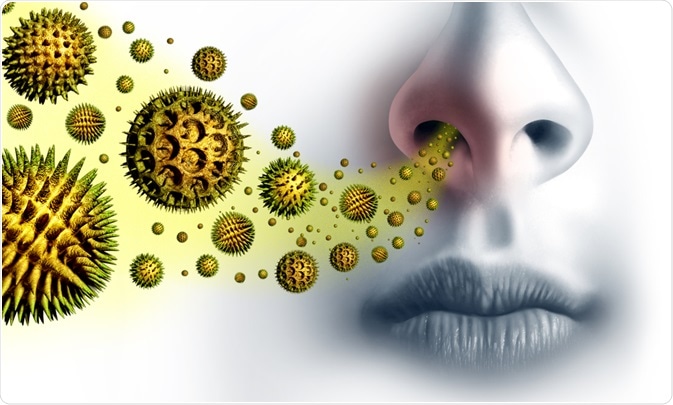COVID-19 is a respiratory disease characterized by symptoms that may in part overlap with some symptoms of an allergy (including asthma or eczema). Many of the preventative measures used in combatting COVID-19 spread such as face coverings and handwashing can aggravate allergy symptoms.
Furthermore, people with a history of severe allergic reactions should be careful when receiving a COVID-19 vaccination, as some of the vaccinations may not be suitable for people with allergies.

Image Credit: Lightspring / Shutterstock.com
Allergy symptoms and COVID-19 symptoms
Many people who suffer from allergies may have symptoms that overlap with the symptoms of COVID-19, without actually having COVID-19. Conversely, people who suffer from allergies may have similar symptoms that could be due to COVID-19 and may go unnoticed as allergy symptoms. It is therefore important to distinguish between allergy symptoms and any new symptoms that arise which could be due to COVID-19.
Whilst the main symptoms of COVID-19 are not typically associated with the symptoms of allergies, there are cases where additional symptoms may develop such as hives/rashes, coughing/sneezing, runny nose, pinkeye or blueish toes (COVID toes), that can develop which have some overlap with allergy symptoms. In the worst-case scenario, having difficulty breathing could be related to allergy, but also due to COVID-19 which may not resolve with anti-allergy treatments (such as an inhaler) and as such must be treated as an emergency.
For example, symptoms associated with hay fever tend to be predictable, limited and vary with temperature/pollen count and respond well to antihistamines. Whilst many of these symptoms are not associated with COVID-19, there are some cases when some of the aforementioned symptoms may present with COVID-19 (not due to allergy) and will typically not respond to antihistamines. Thus, it is essential to treat hay fever symptoms proactively to minimize confusion with COVID-19.
Those suffering from asthma are possibly at an increased risk of more moderate-severe COVID-19 (though not at the highest risk of severe disease) and are encouraged to take up the seasonal flu vaccine to minimize flu risks, as it is possible to have both COVID-19 and flu at the same time. It is also important to control your asthma with regular medications.
It is worth mentioning that many anti-allergy medications do not increase the risk of developing more severe COVID-19, however, in some cases people that take steroids orally often have reduced immunity and as such may be more predisposed to a higher risk of developing COVID-19. Topical steroid creams used for eczema for example do not pose a reduced immunity risk.
Finally, those suffering from any allergy – including food allergies – should they come into contact with an allergen whilst having COVID-19 may (in some cases) suffer from a worse allergic reaction. Therefore, it is important that extra caution is exercised following a positive COVID-19 result, and regular medication is continually taken.
Asthma and face coverings
Face coverings, especially indoors, is an important method to prevent the spread of SARS-CoV-2 between people where ventilation is poor or when social distancing is not achievable. Those with severe asthma may be legally and medically exempt from wearing face coverings where they are legally required to do so, such as in shops/indoor public spaces.
People with mild or moderate asthma will be able to cope with wearing a face-covering. However, those with severe asthma with frequent exacerbations, frequent symptoms and hospital visits may not cope well with a face-covering and as such should obtain a medical exemption from their doctor.
However, it may be that specific types of face masks might more suitable, thus exploring the range of options (more breathable fabric) before opting not to wear one at all is probably the more appropriate course of action, especially in the spirit of collective public health.
Eczema and handwashing
Handwashing using soap and hot water for at least 20 seconds or using hand sanitizer with 70% alcohol content or more is the best way to kill viruses on your hands and in the prevention of the spread of SARS-CoV-2. However, those with eczema may notice that their symptoms worsen with frequent handwashing and especially after sanitizing.
Moisturizing immediately after handwashing and sanitizing may mitigate some of the adverse effects of frequent handwashing on the skin. Sanitizers tend to be harsh on the skin, so if possible, those that suffer from eczema should preferentially use warm water and soap to wash their hands whenever possible followed by moisturizing.
However, if using sanitizer, moisturizing can also reduce some of the dryness. Not choosing to sanitize is not appropriate given the need to combat the spread of COVID-19, and the benefits of sanitizing outweigh the risks associated with dry skin.
Differences Between Seasonal Allergies and COVID-19
Vaccinations
People who suffer from severe allergic reactions (especially to any vaccine or injectable medicine) are advised to seek medical advice before getting any COVID-19 vaccine. Some of the current emergency vaccines are mRNA-based vaccines (Pfizer/BioNTech and Moderna).
Anyone who has had an allergic reaction to such vaccines; or any of their ingredients, should not get these vaccines, and instead wait for a non-mRNA vaccine such as the Oxford/AstraZeneca vaccine. By the middle of this year, many more non-mRNA-based vaccines will be widely available allowing a greater choice after careful medical considerations.
In summary, some of the symptoms associated with certain allergies may share commonalities with the symptoms of COVID-19/flu/cold, and proper management of allergy symptoms is important throughout the pandemic period, especially in distinguishing between symptoms.
People with specific allergies such as asthma, eczema and food allergies should stay proactive and maximize their efforts in reducing their risk of getting COVID-19. Specific considerations must be applied to those with severe allergies such as the choice of mask fabric. Finally, those with histories of severe allergic reactions to vaccines should not take mRNA-based vaccines and should in turn wait for other vaccines to become available.
References
Further Reading
Last Updated: Jan 17, 2022